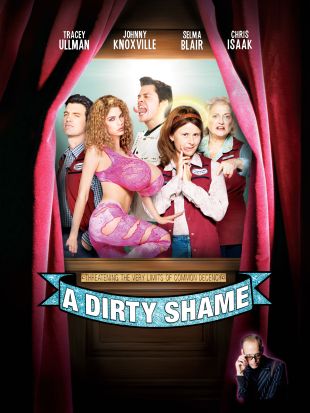
Like a cartoonish version of They Came From Within that substitutes head injuries for parasites and an uptight Baltimore neighborhood for a futuristic high-rise apartment complex, John Waters' A Dirty Shame finds the so-called "Prince of Puke"'s career coming full circle. For a while, it seemed that age had mellowed Waters somewhat, and though such later efforts as Serial Mom and Pecker certainly had a cheeky edge over the average Hollywood fare, it was simply harder to shock audiences into laughter in an era when South Park aired nightly and "special edition" DVDs offered raunchier, more explicit versions of films originally rated PG-13 or R when released to theaters. In short, it seemed that the precedent that Waters had set with his own shock classic Pink Flamingos had come back to haunt him. Thankfully for longtime fans, Waters was more than up to the challenge of regaining his former glory, and Fine Line Features was willing to support that decision by granting him the liberty to shoot an NC-17 film (though, even with that rating, one gets the occasional feeling that Waters was holding back). Supported by a game cast that includes Tracey Ullman and Chris Isaak, Waters not only takes on the sexual hypocrisy that has come to define the mores of post-nipplegate America, but also the very source of that anxiety by casting Johnny Knoxville as a sexual Jesus who has come to bring the "resurrsextion" to Hartford Street. The film also offers some of the most quotable dialogue of Waters' recent filmography, and when Ullman's sex-crazed Sylvia Stickles begs husband Vaughn (Isaak) to "discover the oyster," one can't help but chuckle at recalling the classic dialogue that defined such early efforts as Desperate Living. Though it doesn't possess the mean streak that defined Waters' early efforts, A Dirty Shame is still more Female Trouble than Cry-Baby, and the collection of naughty novelties that litters the soundtrack even finds his musical selections hearkening back to the pre-Polyester era. Leave it to Waters to revert back to his old deviant ways just as a Broadway version of his 1988 comedy Hairspray (the director's first PG-rated film) threatened to bring him some amount of "mainstream" respectability -- and longtime fans simply wouldn't have it any other way.
